"OCIMF continues to contribute to the ongoing improvement in the safety and environmental performance of oil tankers."
Director's Log

October saw the 60th anniversary of the start of the Suez Crisis, which led to a five-month closure of the Suez Canal.
This was an historic event in many ways, but for the oil tanker industry it was hugely significant. The canal closure meant that tankers transporting oil from the Middle East to the west were forced to take the substantially longer route around Africa. No longer bound by the size restrictions of the canal, this paved the way for the building of ever larger tankers, including supertankers, Very Large Crude Carriers (VLCCs) and Ultra Large Crude Carriers (ULCCs).
These larger oil tankers brought with them their own safety risks, particularly the risk of fire and explosion due to a build-up of static electricity during cargo tank washing. The industry’s response was to develop the use of inert gas in the cargo tank ullage spaces on larger ships carrying oil cargoes; potentially the most significant safety innovation on tankers of the twentieth century. An OCIMF task force is currently working on an information paper that will give further guidance to the industry on the use of inert gas during the carriage of volatile hydrocarbon. In this way, OCIMF continues to contribute to the ongoing improvement in the safety and environmental performance of oil tankers.
October has seen the completion of the OCIMF Principal Committee meetings for 2016. These committees are the driving force of the Forum and they have addressed, among many other issues, the forthcoming release of the Offshore Vessel Inspection Database (Offshore Marine Committee), the Inert Gas paper (General Purposes Committee), the revision of the Mooring Equipment Guidelines (Ports and Terminals Committee) and the review and revision of the Forum Constitution (Legal Committee). My thanks to all committee members who help to keep OCIMF at the forefront of safety and environmental issues in the offshore and tanker sectors.
In this month's newsletter, you will see a report from OCIMF Deputy Director Jeremy Hudson on the recent Marine Environment Protection Committee (MEPC) meeting. This resulted in several important decisions being made, including confirmation that the implementation date for the global sulphur cap will be 2020. Read on for more details.

Andrew Cassels
Director OCIMF
Do you have news that you'd like to share with our readers? If so email
GPC dates revised
The General Purposes Committee (GPC) meeting in Singapore will now take place from 10 to 11 October 2017.
Previous dates were 26 to 27 September 2017.
Global sulphur cap of 0.5%
In 2008, the Marine Environment Protection Committee (MEPC) of the International Maritime Organization (IMO) agreed to a global cap of 0.5% m/m sulphur content for fuels under regulation 14.1.3 of MARPOL Annex VI.
The decision of whether to introduce the cap in 2020 or 2025 was to be based on an assessment of low sulphur fuel oil availability; this was originally due to take place in 2018 but was brought forward to 2015 to give sectors more time to prepare. The assessment of the likely fuel oil availability in both these years was conducted by two consultancies: CE Delft (the official assessment) and EnSys Energy (a parallel but informal assessment). While the two consultancies agreed on the likely level of demand for marine fuel in 2020, they disagreed on the likely level of supply of low sulphur fuels; CE Delft concluded that there would be sufficient supply based on potential capacity whereas EnSys Energy felt there would not be, based upon likely availability.
This led to a lively discussion at MEPC 70, where, with a clear majority from the western countries, the decision was made to introduce the 0.5% sulphur limit on 1 January 2020. The IMO accepted the official recommendations from CE Delft that there would be a sufficient supply of low sulphur fuel in 2020 to meet demand, but they also acknowledged that there would need to be an effective transition plan in place to address any potential safety and stability issues. IMO's Pollution, Prevention and Response (PPR) subcommittee will consider these issues and make recommendations in the run-up to the introduction of the cap.
OCIMF will continue to monitor the situation and work to provide guidance to the maritime oil industry on the safety and environmental implications of meeting the requirements of the cap. Future updates will be made through this newsletter. For current OCIMF guidance in this area, the following information papers may be useful:
- Guide for Implementation of Sulphur Oxide Exhaust Gas Cleaning Systems
- Recommendations on the Hazard Assessment of Fuel Changeover Processes
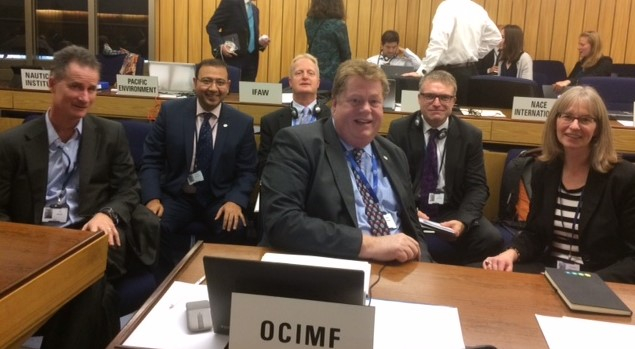
OCIMF at the MEPC. From left to right: Tom Briggs, BP; Saurabh Sachdeva, BP; Rob Collier, Shell; Jeremy Hudson, OCIMF; Justin Longhurst, BP; Alexandra Ebbinghaus, Shell.
IMO news
The 70th session of the Marine Environment Protection Committee (MEPC) was held from 24 to 28 October at the IMO headquarters in London.
Overall it was a well-attended committee meeting with many strong delegations from 98 countries, as well as many intergovernmental and non-governmental organisations (IGOs and NGOs). The agenda was heavy, with more than 170 papers to be discussed. That main business was completed within the five days was due to the best efforts of the Chair and some long hours by work groups, on one occasion until 1:30am.
The main points of interest were mainly dedicated to ballast water management, air pollution and energy efficiency, technical and operational measures for enhancing the energy efficiency of international shipping, and the protection and identification of special areas. The following points will be of particular interest to OCIMF members.
Measuring, Reporting and Verification (MRV) – data collection
The Committee adopted amendments to Marpol Annex VI for introducing a mandatory data collection system with changes covering distance travelled over the ground and time underway. Full details on the data collected are included in the main report.
Data collection will start from the 2019 calendar year.
Ballast Water Management (BWM) Convention
The Committee noted that the number of contracting governments to the BWM Convention was greater than 50% of the world's merchant fleet. There was agreement to the revised G8 guidelines for approval of BWM systems, and that they should become mandatory. The roadmap for implementation is still not clear with many options proposed. This discussion will continue via Correspondence Group and further discussion at MEPC 71 in 2017.
Reduction of Greenhouse Gas (GHG) emissions
Discussions supported the concept of a roadmap with firm GHG targets to be implemented following a three-step approach: data collection, analysis and decision. There was agreement that the analysis (step two) should start no later than autumn 2020 and decisions (step three) should take place in spring 2022. The GHG roadmap extends to 2023. An intersessional working group will also be established to look at the reduction of GHG emissions from ships. Their work will run in parallel to the three-step approach outlined above.
Schedule for global fuel oil sulphur cap
The decision was made to introduce the global cap of 0.5% sulphur content in marine fuels on 1 January 2020. This decision was always going to be both controversial and historic. The IMO accepted the conclusions of the official assessment of low sulphur fuel availability, that said there will be adequate fuel to meet the demand. The Pollution Prevention and Response (PPR) subcommittee will consider safety and stability issues and make recommendations. Significant discussions will need to take place on the potential capability and the realistic availability of low sulphur fuels, and the transition rollout.
Baltic and North Sea NOx Emission Control Area (NECA)
MEPC 70 supported a new NECA for the Baltic Sea and North Sea, including the English Channel, which will enter into force for new ships constructed after 1 January 2021. This is subject to adoption of the amendments at MEPC 71.
Energy Efficiency Design Index (EEDI)
MEPC 70 discussed the previously agreed rate of reduction of the EEDI (3 steps of efficiency improvement/emission reduction of ship engines, depending upon ship type). The target dates and levels of reduction for phase 1 and phase 2 remain unchanged, however the Committee agreed that it would be necessary to start a thorough review of EEDI phase 3 time and target requirements. It was agreed that a thorough review should be completed in time for adoption of the necessary amendments to MARPOL Annex VI, for early implementation of phase 3 in 2022, and if agreed, introduction of a phase 4 with even more demanding efficiency targets as soon as possible thereafter.
Questions on IMO activities can be sent to Jeremy Hudson, OCIMF Deputy Director and Chief Representative to the IMO, at 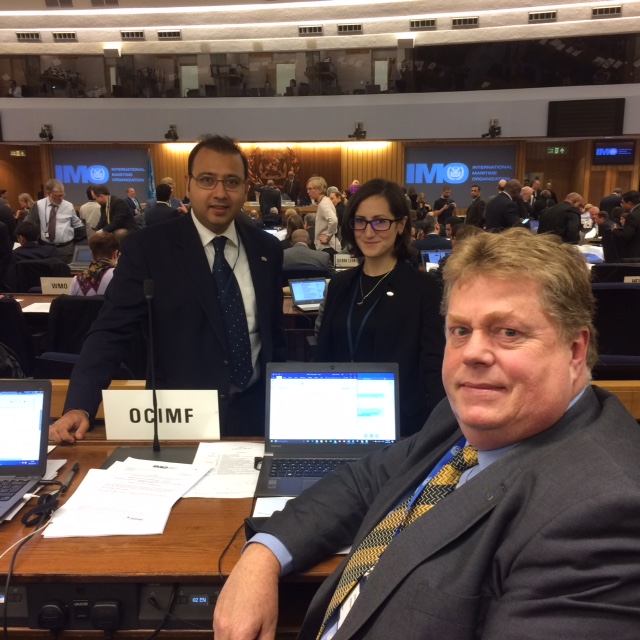
Jeremy Hudson with Jana Ames and Saurabh Sachdeva from BP.
SLOM conference
OCIMF were invited to support the Sociedad Latinoamericana de Operadores de Terminales Maritimo Petroleros y Monoboyas (SLOM) at their annual conference.
SLOM is a non-profit organisation that promotes safe, sustainable and efficient monobuoy operations through developing and sharing best practices and their conference brings together the marine community in Latin America. SLOM and OCIMF have a relationship of mutual support spanning a decade.
The conference was held in Mexico City from 3 to 5 October. OCIMF organised a workshop on Ship to Ship (STS) best practices. Arthur Sequeira (Phillips66), Andy Bickerdike (Chevron), Will Doolittle (BP) and Rob Drysdale (OCIMF) gave presentations, followed by an active Q&A session with the audience. Around 300 people attended the conference, including representatives from many of OCIMF's Latin American members and some North American members.
SLOM are actively involved in the development of an OCIMF best practices information paper for station keeping during loading/unloading offshore, and the conference provided an additional opportunity to hold a meeting of the Station Keeping Work Group.
For more information on SLOM, please visit their website.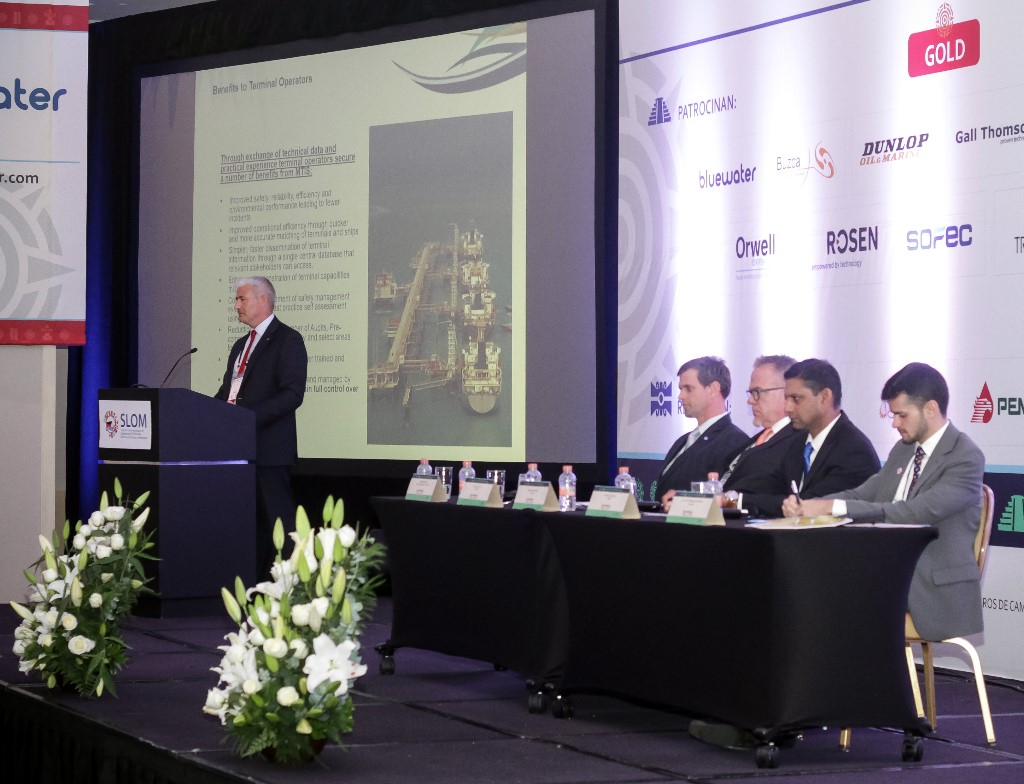
Rob Drysdale speaking at the OCIMF workshop panel, with (from left to right) Will Doolittle, Andy Bickerdike, Arthur Sequeira and panel moderator Luiz Filipe Ferreira de Santana (Transpetro, and Chair of the Station Keeping Work Group).
SIRE and OVID training
October was a busy month for OCIMF Training and Accreditation Manager Oliver Pointon, who led four training courses across two continents.
The training was for Ship Inspection Report Programme (SIRE) new inspectors, as well as refresher courses for inspectors for both SIRE and the Offshore Vessel Inspection Database (OVID) programme.
In Singapore, a SIRE New Inspector course, a SIRE Refresher course and an OVID Refresher course drew almost 70 inspectors in total. At a request by OCIMF member Ecopetrol, a SIRE New Inspector course was also held in Cartagena, Columbia, with a total of 24 attendees.
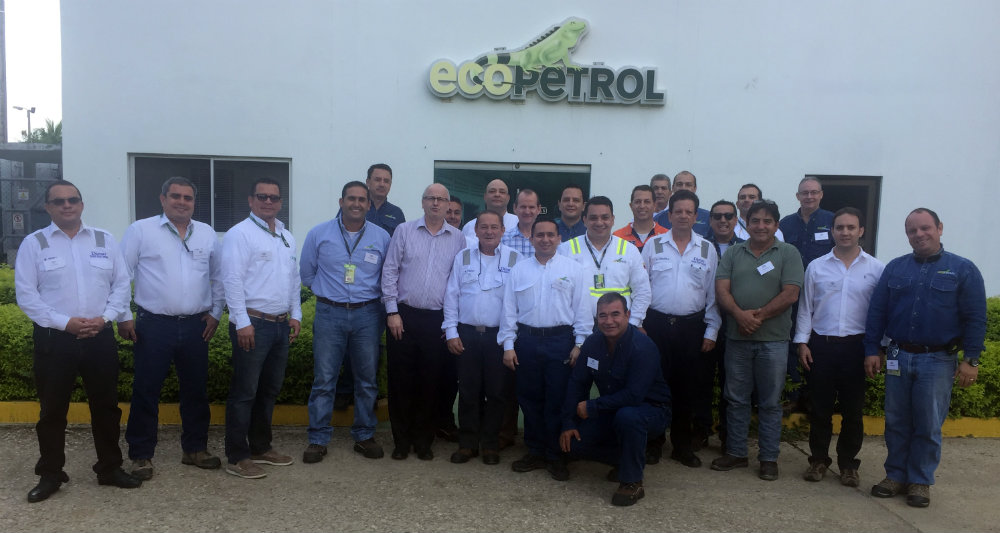
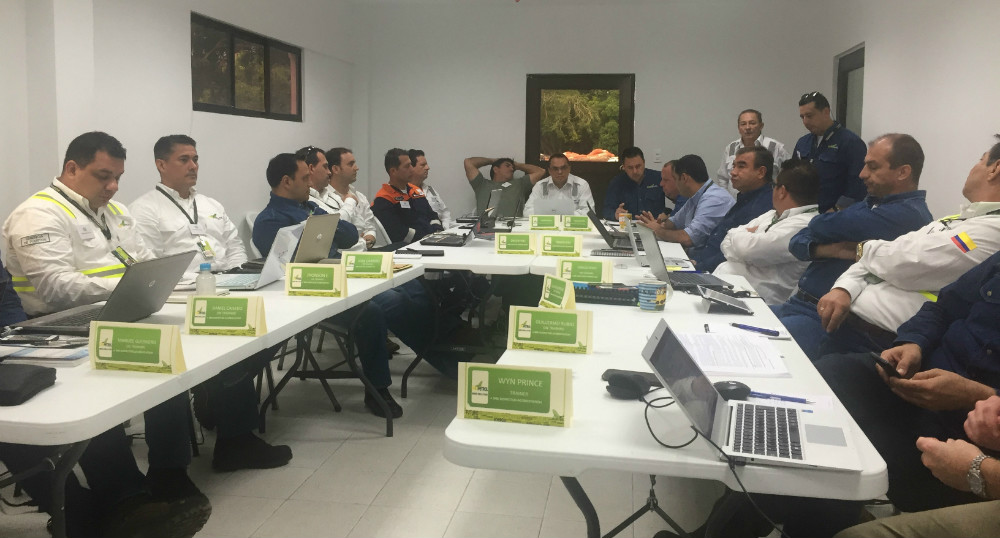
The Compliance Manager role
To succeed in this mission, both OCIMF and the oil industry need to be confident in the integrity of the forum's output. This output comes in many forms, but is centred around programmes, publications and representation at the IMO.
The Compliance Manager's job is to ensure the integrity of the SIRE and OVID programmes. They are responsible for developing ways to monitor both the behaviour of inspectors and the use of programme outputs. It is a collaborative role requiring interaction with all submitting and receiving member companies, as well as with the accredited inspectors and Secretariat staff.
The Compliance Manager role was created in October 2008 and was initially filled by Oliver Pointon. Subsequently this role has been filled by a secondee from a member company. Patrick McGroggan, who is currently in the role, is pictured below with the first two seconded Compliance Managers; Rob Collier and Shaikh Rahim. As part of a recent reorganisation to the OCIMF Secretariat reporting structure, the Compliance Manager role now reports to Philip Pascoe, General Counsel, who is also pictured below.
In 2017 the Compliance Manager will focus on the effectiveness of SIRE and OVID compliance to ensure these inspection programmes continue to deliver quality inspections. OCIMF will develop tools that will analyse the ‘big data’ available in the SIRE and OVID databases to identify discrepancies in submitted reports and flag weaknesses in inspectors’ and submitting members’ performance. This will inform the Compliance Manager’s audit processes and allow the Training and Accreditation Manager to develop these learnings into future training programmes.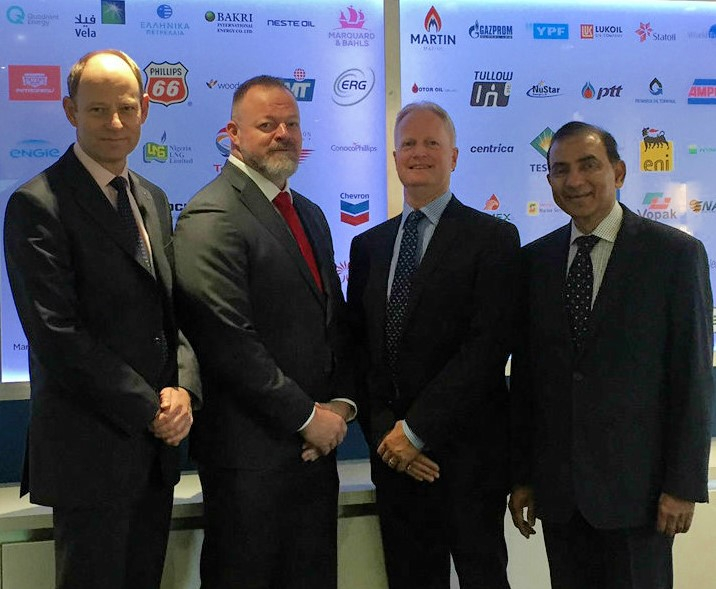
From left to right: Philip Pascoe, Patrick McGroggan, Rob Collier and Shaikh Rahim.
Maritime security snippets
Red Sea/Bab el Mandeb
Readers may be aware of the delicate situation in this region and the threat to shipping from an extension of the conflict in Yemen. Although the recent ceasefire announcement is encouraging the area remains at risk and guidance issued to industry by the United Kingdom Marine Trade Operations (UKMTO) organisation remains in place.
Somali piracy
OCIMF was delighted to learn 26 hostages had been released by Somali Pirates on 22 October after nearly five years in captivity. The mariners, who were all from Asia, were on board the Omani-flagged fishing vessel Naham 3 when they were captured in March 2012. The considerable effort and dedication of several agencies to secure the release of these people is very much appreciated.
Lomé summit
African leaders met on 15 October in Lomé, Togo to sign a charter aimed at improving maritime security in the Gulf of Guinea and other vulnerable areas. The Congolese President Denis Sassou Nguesso described the agreement as "historic", while Kenya's President Uhuru Kenyatta said it showed Africa's ability to put together a continent-wide strategy.
The charter is designed to improve information sharing between African nations, a weakness identified by the OCIMF Maritime Trade Information Sharing Centre – Gulf of Guinea (MTISC–GoG) project. Opening the summit, Chad's President Idriss Déby (Head of the African Union), noted "some 90 percent of Africa's imports and exports are transported by sea, making maritime security key to the continent's economic future."
Although piracy off the coast of Somalia is at an all-time low, the level of piracy and maritime crime in the Gulf of Guinea remains of concern. More details of the summit can be found here.
Cyber Working Group
The Executive Committee has asked OCIMF to take a closer look at how cyber attacks affect member companies' operations and safety. At their meeting in September, the General Purposes Committee (GPC) approved the formation of a Cyber Working Group. Any member wishing to contribute to this effort should contact the Security Advisor Russell Pegg at
Port and Terminals Committee
The 85th meeting of the Ports and Terminals Committee (PTC) took place in Singapore from 26 to 27 October.
Covering a very busy agenda discussing progress from work ongoing in each of the sub-committees (Ship to Ship, Marine Terminal, and Marine Structures and Civil Engineering focus groups), the PTC also reviewed progress on the Mooring Equipment Guidelines (MEG). The MEG revisions are following a project management process that includes enhanced planning of activities prior to drafting, and monitoring of multiple workgroup deliverables via Gantt charts. A full update on MEG follows below.
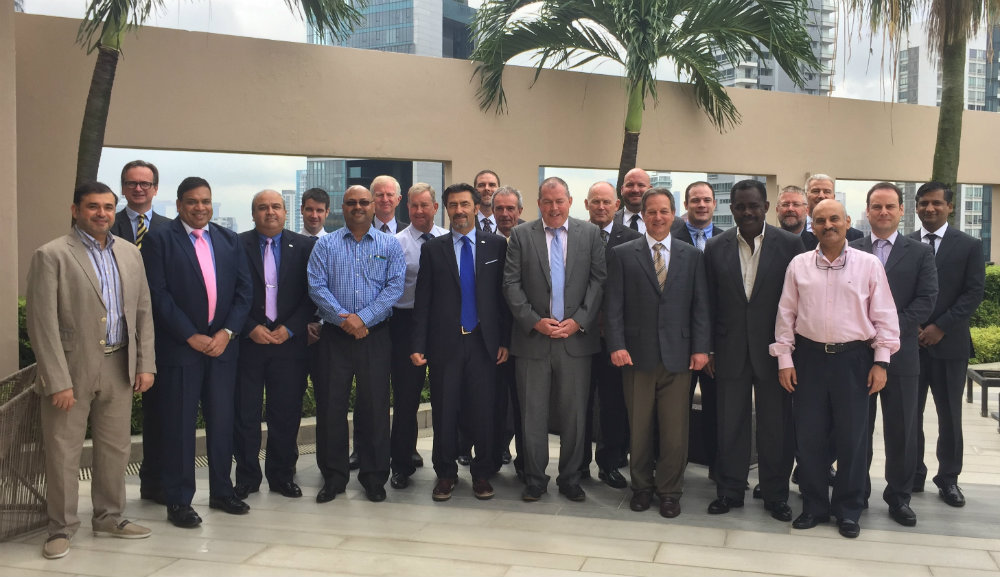
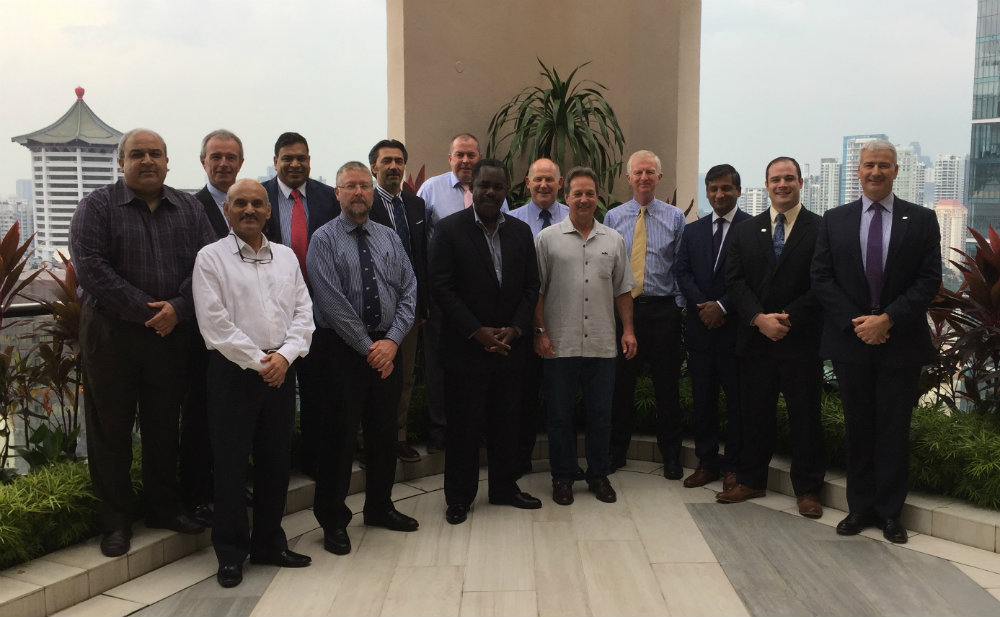
The Ports and Terminals Committee (top). From left to right: Adel Al Ali, ENOC; Frank Jan Thijssen, Vapak; Anuj Gupta, IMT; Imran Khan, Excelerate; Ross Greig, INEOS; Mahesh Singh, Phillips66, Andy Dogherty, Maritime Safety Matters; Anthony Pollock, INEOS; Salvatore Bianca, ENI; Luciano Maldonado, Petrobras; Patrick Vantenat, Total; Andy Glass, BP; Kevan McGregor, Shell; Derek Thompson, Phillips66; Mike Sitts, Chevron; Eric Vincent, Hess Corporation; William Assante, ExxonMobil; Peter Wright, Woodside; Rob Drysdale, OCIMF; Rakesh Dhir, ConocoPhillips; Carlos Masot, ENAP; Cherian Oommen, SIGTTO. The Mooring Equipment Guidelines steering group (bottom). From left to right: Imran Khan; Patrick Vantenat; Rakesh Dhir; Anuj Gupta; Peter Wright; Salvatore Bianca; Andy Glass; William Assante; Kevan McGregor; Mike Sitts; Andy Dogherty; Cherian Oommen; Eric Vincent, Rob Drysdale.
Mooring Equipment Guidelines – update
October marked another busy and productive month for the working groups involved in revisions to OCIMF's Mooring Equipment Guidelines (MEG).
Both the High Modulus Synthetic Fibre (HMSF) and MEG4 working groups met to review technical material and consider how proposed amendments to SOLAS on safe mooring operations being drafted by the IMO might be incorporated into the revised publication.
The MEG Steering Group met to review overall progress before submitting a report to the Ports & Terminal Committee (PTC) in advance of their meeting in Singapore. PTC members were pleased with the overall progress, noted the challenges facing the working groups to produce the publication to schedule, and expressed their gratitude to all participants for their continued support and collaboration in the project. November will be equally busy as the working groups begin the process of finalising draft text and circulating for internal review by OCIMF members via the technical committees.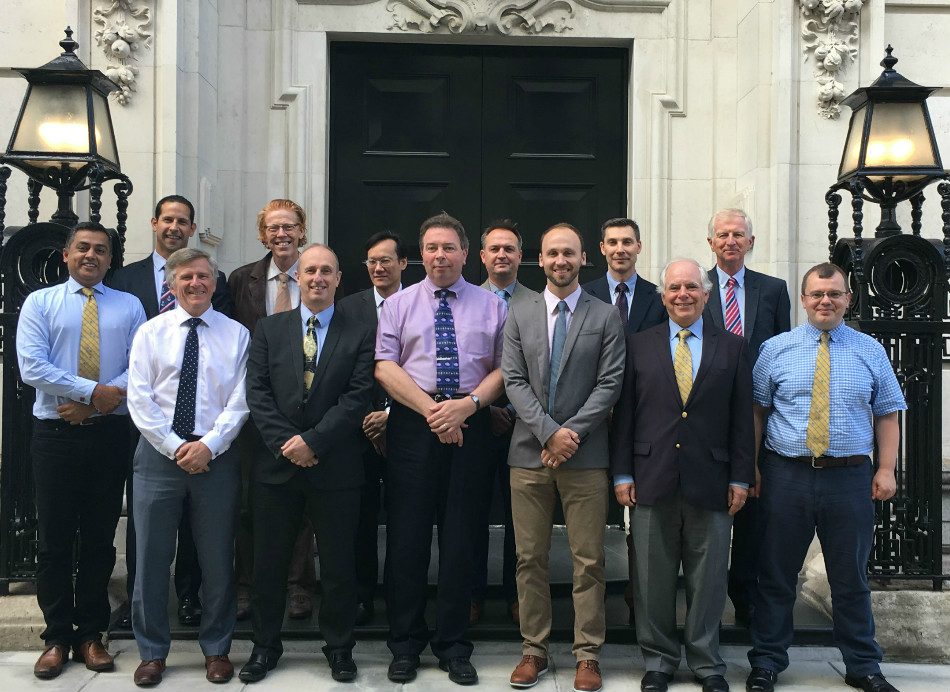
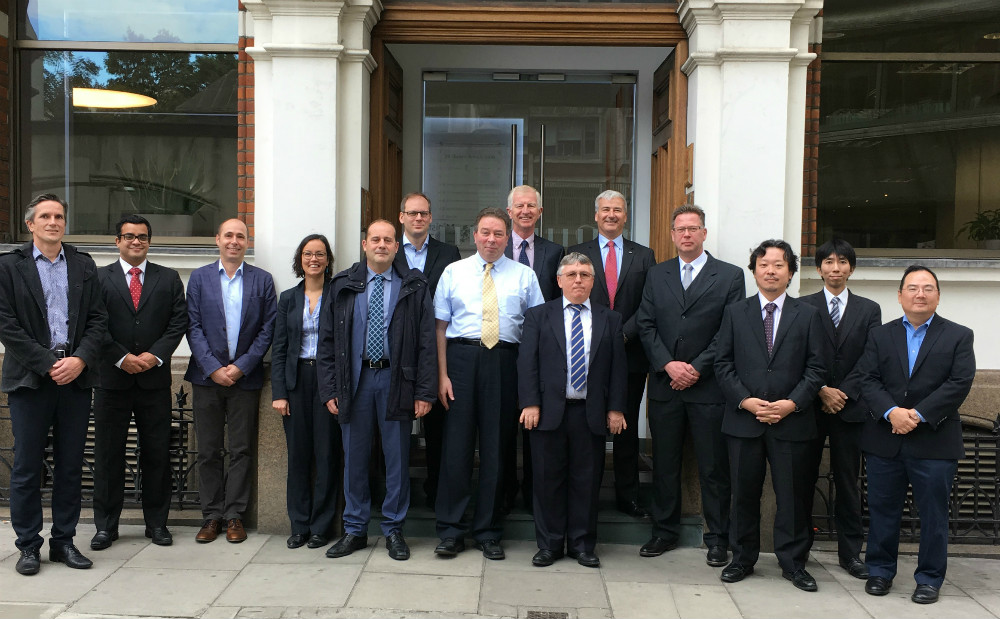
HMSF working group (top). From left to right: Ajay Gour, INTERTANKO; Joe Megeed, OCIMF; Andrew Cassels, OCIMF; Jac Spijkers, Dyneema; Chris Snape, Shell; Rod Yam, IACS; Iain Chadwick, Chevron; James Mackay, TTI; Kris Volpenhein, Samson; Mark Huntley, Cordage Institute; Antonio Freitas, Eurocord; Andy Dogherty, Maritime Safety Matters; Tim Hunter, Eurocord. MEG4 working group (bottom). From left to right: Joppe Burgers, IAPH; Shaun Pinto, Maersk Tankers; Steve Banfield, TTI; Julie Tallot, Total; Allesandro Rici, OLT Offshore; Adrian Kahl, DNV GL; Iain Chadwick, Chevron; Andy Dogherty, Maritime Safety Matters and Chair of MEG steering group; Martin Shaw, MOAMS; Rob Drysdale, OCIMF; Burkhard Holinka, Macgregor; Tetsuo Shiroyama, Imabari Shipbuilding; Hiroyuki Uchibori, Mitsui Engineering and Shipbuilding; and Rod Iwashita, PIANC.
